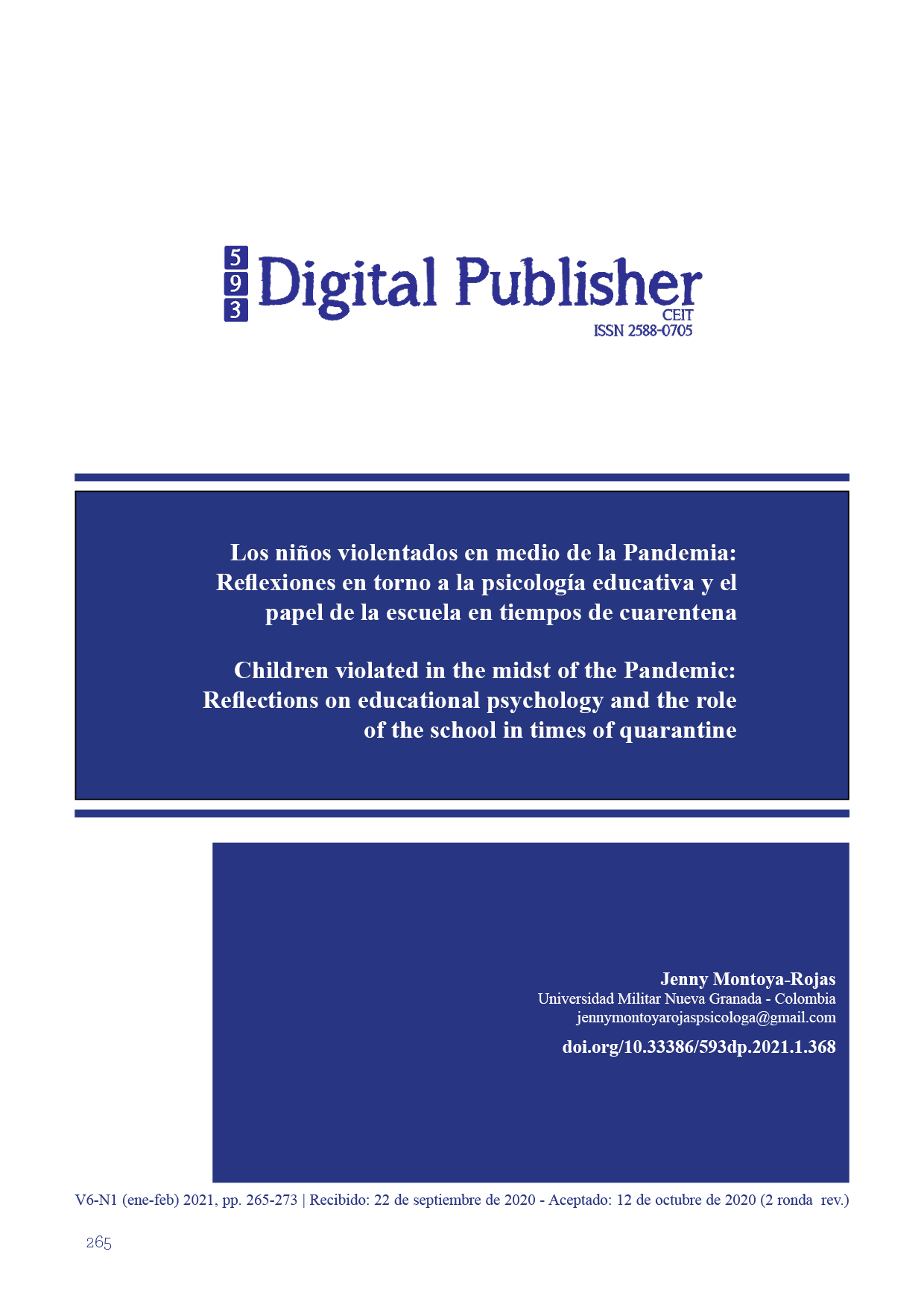Los Children violated in the midst of the Pandemic: Reflections on educational psychology and the role of the school in times of quarantine
Main Article Content
Abstract
On the occasion of the health emergency due to coronavirus COVID-19- and the measures taken by the District Secretary of Government of Bogotá, in conjunction with the Ministry of Education of Colombia, when the pandemic was declared, an initiative arises from the Secretary of Education with the name of '' Learn at Home '', a strategy that aims to guarantee the right to education of children and young people in Colombia, designed from the strengthening of the home as a learning environment in pedagogical proposals oriented from the school, and supported from co-responsibility , autonomy and care for students.
However, despite all the efforts that have been made, it has not yet been analyzed what happens to those children who, having a history of having been violated at home, have to confine themselves permanently, facing not only difficult daily situations, but also that also the one that, from the pandemic, begins to exacerbate conflicts within their family environments.
It is here where the school takes relevance and in it the accompaniment that is bridged through educational psychology which, if it is difficult to develop in person, becomes more urgent to understand its dimensions in the distance and in the lack of security of the environments here the children are.
For the purposes of this study, the following will be analyzed: the role of the family as a generator of a secure bond; the role of the educational psychologist as a facilitator of the educational processes of boys and girls, of their families, forming a model of school as an environment oriented towards caring for the other.
Thus, finally, denote the importance that educational psychology has in schools, identifying some of its greatest tensions and raising some proposals for reflection that allow re-signifying the accompaniment that the school provides to children in vulnerable situations.
Downloads
Article Details

This work is licensed under a Creative Commons Attribution-NonCommercial-ShareAlike 4.0 International License.
1. Derechos de autor
Las obras que se publican en 593 Digital Publisher CEIT están sujetas a los siguientes términos:
1.1. 593 Digital Publisher CEIT, conserva los derechos patrimoniales (copyright) de las obras publicadas, favorece y permite la reutilización de las mismas bajo la licencia Licencia Creative Commons 4.0 de Reconocimiento-NoComercial-CompartirIgual 4.0, por lo cual se pueden copiar, usar, difundir, transmitir y exponer públicamente, siempre que:
1.1.a. Se cite la autoría y fuente original de su publicación (revista, editorial, URL).
1.1.b. No se usen para fines comerciales u onerosos.
1.1.c. Se mencione la existencia y especificaciones de esta licencia de uso.
References
Bártolo, I. D., & Seitún, M. (2019). Apego y Crianza . Ciudad Autónoma de Buenos Aires: Grijalbo.
COLOMBIA, CONGRESO DE. (23 de 07 de 2020). Presidencia de la República de Colombia. Obtenido de https://dapre.presidencia.gov.co/normativa/leyes
COLPSIC. (2003). COLPSIC Colegio Colombiano de Psicólogos . Obtenido de https://www.colpsic.org.co/campos-disciplinarios/campo-psicologia-educativa/108
educación, m. d. (s.f.). educación para todos . Obtenido de https://www.mineducacion.gov.co/portal/
Educativa, U. P. (4 de 2 de 2018). PARTE 1 PARADIGMAS, ENFOQUES Y MÉTODOS EN LA INVESTIGACIÓN EDUCATIVA. Obtenido de https://nanopdf.com/theme/img/logo-nanopdf.png.
Gaviria, A., Córdoba, R., Cobos, J. E. (03 de Junio de 2020). Volver a salir: ¿Qué ganan niñas, niños y familias? (C. P. Ospina, Entrevistador)
GOBIERNO NACIONAL . (16 de MARZO de 2020 ). https://coronaviruscolombia.gov.co/Covid19/decretos.html#minEducacion. Obtenido de https://www.mineducacion.gov.co/1759/articles-394018_recurso_1.pdf
GOBIERNO NACIONAL . (10 de MARZO de 2020). https://coronaviruscolombia.gov.co/Covid19/decretos.html#minEducacion. Obtenido de https://www.minsalud.gov.co/Normatividad_Nuevo/Circular%20Externa%20No.%2011%20del%202020-.pdf
GOBIERNO NACIONAL . (09 de MARZO de 2020). https://coronaviruscolombia.gov.co/Covid19/index.html. Obtenido de https://coronaviruscolombia.gov.co/Covid19/decretos.html#minEducacion: https://www.mineducacion.gov.co/1759/articles-394597_recurso_1.pdf
Instituto Colombiano de Bienestar Familiar . (2020). Gobierno de Colombia . Obtenido de https://www.icbf.gov.co/mis-manos-te-ensenan/violencia-intrafamiliar-en-cuarentena
Ministerio de Educación . (26 de 03 de 2020). Secretaria de Salud . Obtenido de https://www.redacademica.edu.co/catalogo/gu-de-acompa-amiento-virtual-de-orietadores
Ministerio de Salud y Protección Social. (2018). Ministerio de Salud . Obtenido de https://www.minsalud.gov.co/sites/rid/Lists/BibliotecaDigital/RIDE/VS/PP/politica-nacional-salud-mental.pdf
Nacional, Ministerio de Educación. (25 de 08 de 2019). https://www.mineducacion.gov.co/1621/article-102998.html.
Organización Mundial de la Salud. (2002). Informe Mundial Sobre la Violencia y la Salud. Ginebra, Suiza. Obtenido de https://www.who.int/violence_injury_prevention/violence/world_report/en/abstract_es.pdf
Secretaria de Educación . (23 de Junio de 2020). Educación Bogotá Secretaría de Educación del Distrito . Obtenido de https://www.redacademica.edu.co/catalogo/orientaciones-para-el-acompan-amiento-virtual-de-orientadoras-y-orientadores
UNICEF. (2020). El impacto del COVID19 en los niños, niñas, adolescentes y sus familias , en Americalatina y el Caribe . Fondo de las Naciones Unidas para la Infancia (UNICEF), 1.


